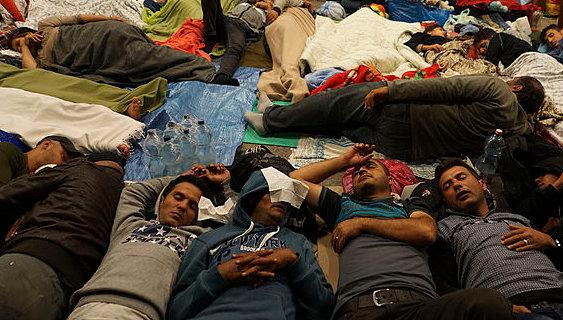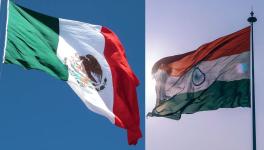Geo-strategic Change: Syria, Ukraine and the G20

Syrian refugees having rest at the floor of Keleti railway station, Image Courtesy: Mstyslav Chernov, wikimedia.org
So often, it is something – seemingly quite minor in itself – which presages major change. The weight of wider strategic change has gradually accumulated, as it were, in potentia, but then, suddenly, some small event triggers its metamorphose into actus (in the medieval terminology). Hasakeh is a small town of some 200,000 souls sitting in the predominantly Kurdish north-east of Syria. It is far from the knives and scimitars of ISIS, and it has long contained a Syrian Army post which has existed calmly amongst the Kurds and the diverse other ethnic groups that make up this small town. Indeed, the army post’s main function has been to protect the minorities from any Kurdish overbearance.
Then, seemingly out of the blue, an incident occurs: Kurdish police seize some of the army garrison members and their families. Reportedly deaths ensue. Here details become hazy, but in gist, matters escalate until the YPG (the Kurdish armed militia, presently supported by the US) starts shelling the Syrian army base with artillery, and vice versa. Ultimately, the Syrian air force intervenes to protect the base. Nothing very special so far — except the attack by the YPG on the Syrian army is strange. Largely, the YPG and the Syrian Army have worked amicably and in co-ordination. Then things take an unexpected twist. The US Department of Defense becomes highly agitated, loudly headlining that US Special Forces are in Hasekeh, and fires off verbal thunderbolts towards Damascus, telling them that further air attacks will be met by a USAF response: Syrian planes may be shot down.
It all seemed very ‘over the top’. Why were US special forces in Hasakeh at all? What were they doing there (this is not ISIS territory)? Had the latter encouraged the YPG to drive out the Syrian army from their base in Hasekeh? In any event, the incident seems to have crystallised a certain conviction, or created as it were, a common cause that had been building inexorably: It was the conviction that America was intent on establishing a Kurdish state in northern Syria which would encompass permanent American and European military bases on its territory – and to this end, the Americans were chasing the Syrian state apparatus out of Hasekeh.
It seemed to confirm Turkey’s worst fears (that this Kurdish statehood precedent could ultimately end with dismemberment of Turkey itself through the secession much of its own territories into a new Kurdish entity). And it seemed to confirm Russian, Iranian and Syrian ‘worst fears’ that the West was resorting to its old ambition, to divide Syria, and to shove a pro-western (Kurdish) ‘wedge’ into the very sensitive heart of the region. In Moscow, there was a sense that the YPG had imbibed unheedingly the kool-aid of American promises of statehood. Well, this small incident seems to have played a part in bringing together states who formerly have shown little trust for each other — and more importantly to furnish them with a common cause. For Turkey, killing off the American-Kurdish ‘project’ trumps even Ankara’s animosity towards Damascus. Rather, both states can see common interest in reminding the Kurds of the regional ‘facts of life’ – or ‘clipping their toe nails’ as one commentator put it.
In any case, Erdogan and the AKP appear to have been experiencing misgivings about their Syria policy and the fall out with Russia – and the American Kurdistan ‘plot’ does provide an useful cloak under which Ankara can gracefully pivot towards restoring relations between Syria and Turkey – and between Turkey and Russia, and Turkey and Iran. And so, diplomacy has been in high gear these last days and it appears that this new ‘contact group’ (Russia, Syria, Iran, Hizballah and Iraq) is edging towards some settlement in Syria. (A process which leaves Saudi Arabia out in the cold – so far).
Of course caution is absolutely essential. Erdogan may overreach militarily beyond what he appears to have agreed with President Putin in St Petersburg: that is to say, a strictly limited military operation to halt the Kurdish presence at the eastern bank of the River Euphrates. The Russians will watch Turkish moves like hawks, for sure. It is quite possible also that Erdogan may overreach politically, demanding too much by way of opposition/“rebel” inclusion in any political process in Syria. These affairs are always highly fragile – this one the more so since there so many diverse actors.
The key issue on which both the Russians and the Americans are left guessing however, is whether Turkey intends to keep one foot in the NATO camp, and one in the Russian camp, or whether we are witnessing a effective withdrawal of Turkey from NATO – or not really at all. Probably Erdogan is happy to keep all sides guessing. However, an analysis of the pattern of dismissals of senior Turkish military officers in Erdogan’s counter-coup according to Metin Gurcin, a former Turkish military adviser, suggests it is Atlanticists and NATOists who have been purged more than others. The Turkish army is having a ‘make-over’ towards a new orientation, Gurcin notes.
In any event, the body-language (if not the rhetoric) of Erdogan at the upcoming G20 meeting this weekend in China should be instructive. Recall that at the last G20 held in Turkey, Erdogan was cold-shouldered by most western participants. Let us see what happens this time. The refugee issue with the EU too, will be reaching a head in the near future. (Erdogan has not been too complimentary to Europeans of late.) Syria will be a main topic for discussion in China (on the margins mainly) – and Prince Mohammad bin Salman will be hovering in the G20 background – no doubt anxiously testing the ground and nature of this putative strategic shift by Turkey. But linked to this exchange is another happening: Ukraine may be coming to a head co-incidentally with the shifts in Syria. And Turkey is a point of commonality to both (through the Tartars, in the case of Crimea).
In this respect, the forthcoming G20 will be different. President Poroshenko is not invited — the Chinese hosts did not include him (unlike past G20 meetings), but Merkel, Hollande and Putin will be present, and intend to discuss Ukraine on the margins of the G20. There are signs that the Europeans are tiring of Kiev (and regretting their sanctions on Russia, into which America had herded them). The IMF too is tiring of Kiev. It has halted disbursements of funds to Kiev, and it is not clear when, or whether, payments may resume. In short, the government in Kiev could implode (or be toppled by the Right Sector and allied fascist groups). This discussion on Ukraine – particularly when taken in tandem with the tentative shifts taking place over Syria – may change the political landscape: for the better, or for the worse.
None of these topics (Turkey’s relationship to NATO, the Syrian conflict or Ukraine) will head the G20 agenda, or will be resolved by the G20, or are likely to receive anything but a cursory (and largely meaningless) mention in the final communiqué. However, it is likely that the G20 will directly or indirectly cast some shafts of illumination on these complex issues which will be important — even if they do not offer any substantive resolution. From the American perspective, the objectives will be to demonstrate continuity of American global ‘leadership’ and to gain acquiescence to a G20 financial strategy (drafted by the US Treasury and the Federal Reserve), in the face of general scepticism, and incipient hostility, toward US Federal Reserve (and allied Central Bank) policy. NIRP (and Central Bank bond-buying) policies are proving to be a political bombshell in terms of its decimation of peoples’ retirement pension prospects, and an economic bombshell in terms of distortion of markets and the undercutting of the European banks’ business model. The US wants yet more financial centralisation, while the global mood is increasingly in the other direction: toward ‘de-globalisation’ financially. The Fed is talking a hike in interest rates (albeit of miniscule size: 25 basis points), but China will object to any strengthening of the dollar – and is likely respond by devaluation (an outcome which sent international markets into turmoil at the beginning of this year)
So while financial and economic policies may prove to be the main field of struggle at this G20, behind this will play out another more profound geo-strategic issue. In a speech at the 95th anniversary of the founding of the Chinese Communist Party on 1 July, President Xi noted: “the world is on the brink of radical changes. We see how the EU is gradually crumbling and the US economy is collapsing. This will end in a new world order” [see here] (that he expects to be realised within the next 10 years). In Xi’s opinion, the relations of Russia and China should not be confined merely to economic relations, but that these countries should create an alternative military alliance:“we are now witnessing the aggressive actions by the United States against Russia and China. I believe that Russia and China may form an alliance before which NATO will be powerless.”
Paradoxically (or not), Zbig Brzezinski, the former US National Security adviser, and architect of the doctrine that the US should extend its hegemony across the Middle East and Asia, with his 1997 book, The Grand Chessboard: American Primacy and Its Geostrategic Imperatives has changed his mind, and now rather tends to Xi’s perspective in his recent article Toward a Global Realignment in the American Interest magazine. Brzezinski now calls for a reversal of strategy and the forging of ties by America with Russia and China: “As its era of global dominance ends, the United States needs to take the lead in realigning the global power architecture. [Both] the emerging redistribution of global political power and the violent political awakening in the Middle East are signalling the coming of a new global realignment. The first of these verities [however] is that the United States is still the world’s politically, economically, and militarily most powerful entity but, given complex geopolitical shifts in regional balances, it is no longer the globally imperial power.”
It is, as it were, a tacit admission by Brzezinski that the US overreached by both launching its Middle East wars and at the same time, prosecuting its hegemony over Russia and China. President Xi however, is pointing more directly to America and Europe’s geo-financial mis-steps as the instrument of the coming foundering of the western political and financial order. This, he suggests will be the seat of struggle – more even than the political.
Disclaimer: The views expressed here are the author's personal views, and do not necessarily represent the views of Newsclick
Get the latest reports & analysis with people's perspective on Protests, movements & deep analytical videos, discussions of the current affairs in your Telegram app. Subscribe to NewsClick's Telegram channel & get Real-Time updates on stories, as they get published on our website.
























